#i mean i saw the parallels between the families of course
Explore tagged Tumblr posts
Text
The parallels between Jay's Arc rn and Nya's earlier In the series is truly something to behold
It would be so interesting if the writers had Nya and the Ninja unintentionally do to Jay what was done to her
What I mean is: Nya's Arc(I'm grossly oversimplifying here btw) In the beginning of the series was about her paving her own path and trying to deal with having little choice In the direction her destiny went. she had to give up her role as the samurai, something she chose to be on her own, to become the water ninja, something that was chosen for her. Then she had to deal with all that was season 6 having her choices essentially snatched from her
She wanted to be the one to choose how her life went. She was tired of others telling her how her life was going to go and not consult her In the slightest
That really parallels Jay's Arc in DR. As I've said before he's had very little choice in his life post merge. Under the control of the administration, while yes he did have some freedom to play video games, we saw just how strict and by the book that place is so we can presume that even with that freedom he still had tight rules he had to obey
Then he left for what he presumed to be freedom under Ras' command. But we all know that isn't true freedom. Jay was lied to, and manipulated to follow Ras' commands. Very strict commands cuz we know who Ras is. And then when he was no longer useful he was promptly tossed out
He finally thought he found some purpose only for that purpose to be snatched away, leaving him with nothing.
Now he's all on his own finally free from anyone's control and I imagine he's not very eager to listen to anyone anytime soon.
Hence why he's now gone Rogue.
Jay and Nya's Arcs are so similar to me message wise that I cannot see it as pure coincidence and I hope that it's used in an effective way
I wanna see Nya unintentionally being a hypocrite. I wanna see her so desperate to get Jay back that she doesn't even try to acknowledge who he is as of NOW In the matter. All she sees is her yin, her love who's lost and alone and needs help and she feels that being with them is the best choice so she makes that decision for him
And of course being with them is better than him being on his own. Thats his family! I know this, you know this but JAY doesn't know this nor does he care right now. And that's the point of view we have to consider cuz through it all Jay's the victim here. He's the one who forgotten everything and is trying to discover his place In the world after being controlled twice now.
All he sees is some random lady that he kinda hates and her friends insisting over and over that he come with them and to go with them. That's where his home is, screw anything else. All he sees is the same shit being spouted to him that Ras prolly did and i imagine it would be infuriating
Tbh They kind of have already started going down that route with having Nya insist that Jay belongs with them. While that is true as I said she doesn't really stop to consider Jay's feelings on the matter even if u can't really blame her
In all likely the Jay she knew would absolutely approve of what she's doing, cuz he would do the same, but that Jay isn't here rn and she's not really considering that. None of the ninja are considering that
They plan on chasing Jay down to get him to come home with them, not really considering(or ignoring) the fact that Jay wants nothing to do with them
They r ignoring his feelings for the sake of trying to get back the Jay THEY know with little consideration with what the Jay of NOW wants
They don't consider the very real potential reality that Jay may never get his memories back, that he may never be the same again cuz they don't want to consider that potential reality
Cuz how would they handle Jay then? Would they accept him as who he is? Or will they continue to search for the Jay they lost, not really caring to know the Jay that is here?
I wanna see that conflict happen, I wanan see Nya being that hypocrite. (albeit unintentionally and trying to help of course) i wanna see her be that pushy and disregarding Jay's feelings cuz she thinks that she knows better. And I want the reality that she hasn't really cared about the Jay of the current to smack her In the face, to smack them all In the face and face that reality perhaps from a new ally of Jay's(me including my huge copium) who doesn't care about his past and just sees him for who he is now
I want Nya to realize how she had been treating Jay this whole time and realize that she messed up. That in her desperation to get her love back, that she had been ignoring Jay's feelings, ignoring his words and trying to decide his life for him, without considering HIM at all, the same thing that had been done to her all those years ago
I'm rambling just to ramble cuz why is this post so long omfg
#kkpaaw#kkpaaw rambles#lego ninjago#jay ninjago#ninjago#lego ninjago dragons rising#ninjago dragons rising#ninjago nya#ninjago jay#jay walker#do yall see the vision?!#obviously their situations were vastly different#but the message in my mind is very similar#and i hope that its not a coincidence and that they do something with jt#grammar
40 notes
·
View notes
Text
I have watched Trust I don't know how many times over the past three years and it only just now occurred to me to look at the dinner that Getty Sr has for Little Paul in the first episode alongside the confirmation celebration for Francesco later on. The parallels! The malignant old men naming their heirs, much to the distress of the heirs' fathers!
The Getty dinner is a cold affair populated by strangers, and the confirmation is a warm community gathering. Getty Sr says "to John Paul Getty the third" with gloating arrogance, and Leonardo says "a Francesco" choked up with pride. Paul 2 sabotages his son's position in the family business out of spite and envy, and Leonardo tries to get his son out of the family business out of love and concern. And they both fail. Both their sons stay trapped.
(By Primo. If it had just been Getty Sr and Salvatore, both boys might have been all right. Little Paul might not have overdosed if he hadn't had all that emotional and physical trauma. Francesco might have left the 'Ndrangheta, or at least not been actively involved in it, if it hadn't been for Primo's money and port. Francesco maims Paul to save Paul's life and in the process dooms himself. I love this fucking show.)
#trust fx#i mean i saw the parallels between the families of course#i'm talking about the dinners specifically#primo nizzuto#leonardo (trust)#john paul getty
19 notes
·
View notes
Text
[...] More specifically, the cycle of violence in The Last of Us Part II appears to be largely modeled after the Israeli-Palestinian conflict. I suspect that some players, if they consciously clock the parallels at all, will think The Last of Us Part II is taking a balanced and fair perspective on that conflict, humanizing and exposing flaws in both sides of its in-game analogues. But as someone who grew up in Israel, I recognized a familiar, firmly Israeli way of seeing and explaining the conflict which tries to appear evenhanded and even enlightened, but in practice marginalizes Palestinian experience in a manner that perpetuates a horrific status quo. The game's co-director and co-writer Neil Druckmann, an Israeli who was born and raised in the [occupied] West Bank before his family moved to the U.S., told the Washington Post that the game's themes of revenge can be traced back to the 2000 killing of two Israeli soldiers by a mob in Ramallah. Some of the gruesome details of the incident were captured on video, which Druckmann viewed. In his interview, he recounted the anger and desire for vengeance he felt when he saw the video—and how he later reconsidered and regretted those impulses, saying they made him feel “gross and guilty.” But it gave him the kernel of a story. “I landed on this emotional idea of, can we, over the course of the game, make you feel this intense hate that is universal in the same way that unconditional love is universal?” Druckmann told the Post. “This hate that people feel has the same kind of universality. You hate someone so much that you want them to suffer in the way they’ve made someone you love suffer.” Druckmann drew parallels between The Last of Us and the Israeli-Palestinian conflict again on the official The Last of Us podcast. When discussing the first time Joel kills another man to protect his daughter and the extraordinary measures people will take to protect the ones they love, Druckmann said he follows "a lot of Israeli politics," and compared the incident to Israel's release of hundreds of Palestinians prisoners in exchange for the captured Israeli soldier Gilad Shalit in 2011. He said that his father thought that the exchange was overall bad for Israel, but that his father would release every prisoner in every prison to free his own son. "That's what this story is about, do the ends justify the means, and it's so much about perspective. If it was to save a strange kid maybe Joel would have made a very different decision, but when it was his tribe, his daughter, there was no question about what he was going to do," Druckmann said.
And continuing, on the security structures featured in the The Last of Us Part II:
Besides the familiar zombie fiction aesthetics of an overgrown and decomposing metropolis, The Last of Us Part II's main setting of Seattle is visually and functionally defined by a series of checkpoints, security walls, and barriers. There are many ways to build and depict structures that separate and keep people out. Just Google "U.S.-Mexico border wall" to see the variety of structures on the southern border of the United States alone. The Last of Us Part II's Seattle doesn't look like any of these. Instead, it looks almost exactly like the tall, precast concrete barriers and watch towers Israel started building through the West Bank in 2000.
Illustrations, from the article:


The first barrier Ellie and Dina encounter when arriving in Seattle / West Bank barrier.
. . . article continues on Vice (July 15 2020)
Backup -> archive.today link /archive.org link
#free palestine#palestine#israel#gaza#the last of us#tlou#tlou2#zionism#i know this article has made the rounds here before but i wanted it archived in case vice goes down
877 notes
·
View notes
Text
Some thoughts on The Discourse about the last BNHA cover
(Note: This Discourse was on Twitter. I don’t know how much of this may have been said here on Tumblr, so consider this either my contribution or just me reporting back on drama from other fronts.)
So, I saw a lot of back and forth over there between people who didn’t like the cover and people who did, and I spent a little while mulling it over. It seemed to me that the people who didn’t like it had a good point, but one they were not articulating particularly well, possibly thanks to the character limit and possibly also because the people talking about it tended to phrase their objections in sarcastic, consciously exaggerated terms because that’s the language months and months of dealing with the truly insufferable Horikoshi Defense Squad on Twitter primed them to use.
So what is the point? Basically this: In going for the lazy/easy callback in both the cover design and Dai (plate-hair kid)'s role in the final chapter more generally, Horikoshi landed on an "everything comes full circle" ending when what the story desperately needed was an indicator of change.
We didn't need to know that a kid with low self-confidence and nothing to speak of in the quirk department can still become a Pro Hero if he[1] wants to. We already knew that because it's what the whole story of BNHA was about! Deku passing the torch/paying it forward is nice if all you care about is Deku's personal arc, but it's sheer reductiveness if you care about literally anything else. If there was going to be a kid getting Deku's encouragement and help at the end, if that's the ending Hori was absolutely set on, it shouldn't have been the Deku Redux kid; it shouldn't have been the weak kid who has already been metaphorically proven capable of becoming a Hero.
1: And of course it would be a boy.
It should have been the troubled kid, the one from the bad family situation, the one who isn't sure whether he even believes in this Hero thing. It should have been the kid who, if nothing about Hero Society had changed, would’ve been rejected by the whole corrupt system—in so many words, the Tenko Redux kid. That's the one who we saw could not become a Hero under the previous system. That's who we needed to demonstrate the system's improvement.
Instead, all we get is Deku helping himself. And it fits, I guess, because “himself” is the only sort of person Deku ever wanted to save anyway—remember that in the very first chapter, Deku tells All Might that he wants to be a Hero because he was never “saved” as a kid and so he thinks saving is the coolest thing ever. Implicitly, then, Deku wanted to be the kind of Hero who could have saved the kid he was, and that tendency to reserve his compassion for people he can recognize himself in—the crying children and the Hero wannabes—is consistent throughout the series. Dai, then, simply becomes the very last of these examples, the chance for Deku to tell his middle school self that he, too, can be a great Hero.
And that’s quite a choice, isn’t it? Take a second to consider the implications there. The metaphorical parallel Deku helps is his middle school self, not his childhood self—there’s no evidence that Dai was bullied on the same level young Izuku was, and we sure didn’t see anyone telling him to jump off a roof. So, who does save those children, then, in this grand, improved version of Hero Society? Does anyone?
Well, not really. Not that we’re shown. Indeed, the child who was the closest analogue to young Izuku—a weak and seemingly quirkless boy who stuck his neck out for other rejected children, who still stubbornly wanted to be a Hero despite a parent's disapproval—was Tenko, and Deku pointedly did not save him.
To be clear, I don’t mean that just in the sense that Deku failed to save the adult Tenko became, but even in the emotional sense that the series clearly wants me to believe Deku succeeded at, the saving of the boy's heart? I don’t think Deku even managed that. Sure, he might have protected the echo of that child from a few memories, might have held his hands for a few exchanges of dialogue, but then the boy transformed back into the form of the Villain he'd become and was swallowed down the spiritual maw of the man from whom society failed to save Tenko to begin with! And what was Deku doing as this happened? Absolutely nothing but yelling impotently as he got blown backward and out of the mindscape.
Imagine that Deku had found some way to cheer up Izumi Kouta only for Muscular to kill the kid thirty seconds later. No one would be saying, “I think Deku still saved him—his heart, anyway,” if Deku got Kouta to smile and admit that Heroes were actually pretty cool only to do nothing but scream helplessly as he watched Muscular pulverize Kouta’s ribcage with one gentle squeeze.[2]
2: Mind you, this comparison is flawed! Unlike AFO’s vestige, Muscular doesn’t turn up to kill a child as a direct result of Deku’s own actions. Also unlike the events of the final battle, Deku doesn't jump up and personally administer the killing blow to the still-screaming victim, either.
It just leaves me thinking about some of the stuff @codenamesazanka has said about how the narrative treats Shigaraki and Deku helping him: not as something Deku has a duty to do, not something Hero Society on the whole owes Shigaraki (and all the other metaphorical expy/future Shigarakis), but rather a bonus, a nice extra, a demonstration to shine up Deku's Hero cred because he's making efforts no one else would bother with and that no one would reasonably expect him to make. It's not Deku’s job to save the Tenkos or the young Izukus of the world; apparently that just falls to society at large.
So then, what was the point of making Tenko/Tomura such an extreme case of someone who started in a similar place to Deku? Why make him, also, a weak kid who was told he couldn't be a Hero, if you're not going to have Deku save him in the way no one saved Deku himself?
From where I'm sitting, the answer is, "It seemed like a good idea to Horikoshi at the time, but proved to be poorly thought out." But if Deku failing to save his own closest childhood analogue was where the story was going the whole time, then Shigaraki should never have been used to parallel Deku to begin with. It's just a damned waste of Shigaraki as a character, an insult to everything he represented, to use him for ~the parallels~ throughout the entirety of the story except the very beginning and the very end.
Anyway, Pro Heroes are bullshit and the ending should have been them being radically reconceived from the ground up with input from all the people they failed to save. But again, if you have to still have Heroes-qua-Heroes at the end, and you have to have some stupid thematic echo because you as an author think callbacks are the single most compelling storytelling tool of all time, then everything we got on Dai should have been for Scissors-kun instead, and here I am very much including Dai's scene before the first war. An unsettling scene of a strange child with his mouth sewn shut, stuck in a straitjacket in a dark room should have been the last thing we saw before launching into the day of the raids, an apparent element for the future in the same way that so many future Villains were first shown in the wake of Stain's arrest.
See, Shigaraki’s own destructiveness is what ultimately frees Scissors-kun from the basement, “saving” this rejected, abused child in a way no Hero ever managed or even knew to try, just as Shigaraki brought light and a strange sort of hope to the lives of so many others whom Heroes failed. However, Shigaraki couldn't carry his ambitions through to the end. He was never able to meet the kid he indirectly saved, never able to offer that appallingly abused victim an avenue for his signature brand of rough justice. Heroes stopped him from doing so. So then, who will help Scissors-kun?
If we’re to believe that the story's protagonist has made a real difference, that Deku and his classmates have changed the world for the better, then we don't need to see them helping a kid who we already know is going to turn out fine because “he” aleady did. We need to see them help the people that previously only Villains would have helped, picking up the torch they struck from Shigaraki’s hands.
So sure, keep the scene with Granny Evil and Scissors-kun if you must, to show that it’s not only Heroes but also the broader Hero Society that’s changed. After that, though, show Deku stepping in. Show him taking an interest in this kid as a way to keep his promises—to Shigaraki, that the rejection and obliviousness that he sought to destroy have indeed been destroyed and will remain so, and to Spinner, that Deku will remember Shigaraki for the rest of his life.
When Deku is older and in a position to give advice to a kid who’s floundering and uncertain of what to do with his life because of what people around him say about him, make that character echo the characters the old system failed to save, not the character who the entire story proved would do just fine.
For god's sake, ditch Deku Redux.
Now, I know the obvious rejoinder here: We can’t use Deku’s story to say that BNHA already showed us that Dai would be fine because Dai has a quirk where Deku did not, therefore Deku’s path would not be open to Dai. To this, I would reply that neither Deku nor Dai specify that Dai wants/is able to be a top Hero, merely that he be the kind of Hero people can admire—which the story has also already proven true!
Ojiro got into UA with nothing but one (1) extra limb.
Manual has a perfectly middling quirk that turned out to be absolutely crucial in two different wars because it was the right quirk at the right time.
Wash’s quirk makes strong bubbles.
Like, this list is not short. Manifest Plates might or might not make Dai Hero Billboard material, but one of the major points of the endgame was the sublime and noble value of helping when you can, in the way that you can. So to reiterate, we didn’t need that to be proven again in the epilogue.
If anything, going the route of retreading the same story makes the epilogue much worse! Not only do we not get to see how this society is helping the people the old society most profoundly failed—victims who fall through the cracks and become Villains—but in seeing yet another a weak kid being mocked for his heroic aspirations, we find that we’ve barely moved a step beyond the exact same place we started.
That’s the message Horikoshi chose to go with, for both the closing chapters of the story and the story’s final volume cover. Truly, as art that summarizes the story goes, it’s a masterful choice! And that's the whole problem. The cover of Volume 42 is a perfect illustration of the self-absorbed, cynical, cyclical nature of BNHA's endgame. Little wonder, then, that it's hated by the same people who hated said endgame.
#bnha#bnha critical#green no. 2#shigaraki tomura#bnha scissors-kun#more protag slander for the discerning palate#stillness has salt#bnha endgame
171 notes
·
View notes
Text
"The cycle of violence in The Last of Us Part II appears to be largely modelled after the Israeli-Palestinian conflict. I suspect that some players, if they consciously clock the parallels at all, will think The Last of Us Part II is taking a balanced and fair perspective on that conflict, humanizing and exposing flaws in both sides of its in-game analogues. But as someone who grew up in Israel, I recognized a familiar, firmly Israeli way of seeing and explaining the conflict which tries to appear evenhanded and even enlightened, but in practice marginalizes the Palestinian experience in a manner that perpetuates a horrific status quo.
The game's co-director and co-writer Neil Druckmann, an Israeli who was born and raised in the West Bank before his family moved to the U.S., told the Washington Post that the game's themes of revenge can be traced back to the 2000 killing of two Israeli soldiers by a mob in Ramallah. Some of the gruesome details of the incident were captured on video, which Druckmann viewed. In his interview, he recounted the anger and desire for vengeance he felt when he saw the video—and how he later reconsidered and regretted those impulses, saying they made him feel “gross and guilty.” But it gave him the kernel of a story.
“I landed on this emotional idea of, can we, over the course of the game, make you feel this intense hate that is universal in the same way that unconditional love is universal?” Druckmann told the Post. “This hate that people feel has the same kind of universality. You hate someone so much that you want them to suffer in the way they’ve made someone you love suffer.”
"That's what this story is about, do the ends justify the means, and it's so much about perspective. If it was to save a strange kid maybe Joel would have made a very different decision, but when it was his tribe, his daughter, there was no question about what he was going to do," Druckmann said.
In the game, most of the Wolves regime's restrictions are directed at a post-apocalyptic religious sect called the Seraphites (the Wolves call them "Scars" after the ritualistic scarring of their faces). These Scars vexed FEDRA as well when it was in control. The dynamic in the city when the game begins is one of conflict, escalation, and a broken truce. The Wolves, like FEDRA, leverage more resources and raw power, while the Scars rely on surprise strikes against Wolf patrols, and a zealous willingness to die for the cause.
To run through just a few key ways in which the Scars uncomfortably reflect some Israeli stereotypes about Palestinians: Later in the game, Ellie finds a location called "Martyr Gate," where the Scars' spiritual leader apparently died, indicating a religious significance of a specific and disputed location, and emphasizing the notion of martyrdom as central to their culture. The Scars are able to get around Wolf patrols and various barriers around the city via an elaborate, secret system of bridges between skyscrapers. These function as a kind of flipped version of the underground tunnels Palestinians use to bypass Israeli blockades and other means of limiting free movement in order to get supplies and carry out attacks on Israel.
In The Last of Us Part II's Seattle, Scars and Wolves hurt each other terribly, and the same can be said about Israel and Palestine. The difference is that when flashes of violence abate and the smoke clears, one side continues to live freely and prosper, while the other goes back to a life of occupation and humiliation. One side continues to expand while the other continues to lose the land it needs to live. Imagining this process as some kind of symmetric cycle benefits one side more than the other, and allows it to continue.
Ellie's journey of revenge seems especially cruel, even idiotic, because we are never given a good reason for why she keeps recommitting to it. Acts of cruelty along the way, like Ellie's torturing another character to get information, are presented as inevitable. This seems to be The Last of Us Part II's thesis: humans experience a kind of "intense hate that is universal," as Druckmann told The Post, which keep us trapped in these cycles. This is not a universal feeling as much as it's a learned way of seeing the world.
The Last of Us Part II is an incredible journey that provides not only one of the most mesmerizing spectacles that we've seen from big budget video games, but one that manages to ask difficult questions along the way. It's clearly coming from an emotionally authentic and self-examining place. The trouble with it, and the reason that Ellie's journey ultimately feels nonsensical, is that it begins from a place that accepts "intense hate that is universal" as a fact of life, rather than examining where and why this behaviour is learned."
The Not So Hidden Israeli Politics of 'The Last of Us Part II' by Emanuel Maiberg
#tlou#the last of us part 2#the last of us#neil druckmann#free palestine#palestine#unfriendly time to rmr who made this game and why the violence is like that#/
1K notes
·
View notes
Text
----------------SPOILERS FOR ARCANE SEASON 2 ACT I BELOW----------------
Alright then, hopefully no one who hasn't watched Arcane S2 Act I yet is reading this. I don't know if this has already been said or not but I was (like so many others) blown away by Act I last Saturday and literally cannot wait for the next two. Full disclosure in case I get any facts wrong (feel free to correct me!!), I have never played League of Legends in my life and know no lore whatsoever outside the show.
I'm fascinated by Isha and Jinx's currently nonexistent but gradually growing relationship. First of all, if I remember correctly, we know that this child's name is Isha only because of a subtitle—she never introduces herself, and no one ever calls her by name. Jinx only acknowledges her grudgingly, and until the very last scene of Episode 3, Sevika acts like she isn't even there.
I think there's parallels to be drawn between Powder and Isha, starting with what I mentioned—both of them are often ignored by the people around them. Of course, Powder was loved by her sister and adoptive siblings and father, most of them just rarely got the chance to really show it. I don't think Sevika or Jinx particularly care about Isha at all as of now, but we don't know much about her past. There's got to be some reason why Chross's men were chasing her, and there's got to be a reason why she apparently has nowhere to go. I would guess she's associated with either Chross, another chembaron, or perhaps a figure like Vander—relevant to the Lanes, but not a chembaron. I would also guess that, like Powder, whatever familial figure she has/had is either dead or has abandoned her.
She's small (although we do not know exactly how old she's supposed to be), does not appear to have much fighting ability, was scared the first time she saw Jinx kill people, and, despite it all, seems to be unnaturally resilient. From the little I've seen, she seems to be good at hiding and sneaking around. These are more traits that seem similar to Powder's. I'd like to add that her flinching when Jinx fired at Chross's men does not necessarily mean she's never seen violence before, but that she's probably never been in the direct line of it. I also think she has some emotional attachment to her hat. That could just be because it's useful, though.
The larger case I want to bring to light, however, is not her resemblance to Powder—but how she differs. There's two scenes where I think this really stands out.
The first is the Jinx and Sevika vs Smeech fight. The setting of the fight bears some similarity to the fight Vi, Claggor, and Mylo get into against some thugs at the beginning of Season 1. Obviously, Jinx and Sevika are much more experienced than the kids were at the time of their fight, but they're also fighting against equally powered opponents. Regardless, the two fights bear a resemblance in where they take place—the streets. Powder is present in one fight mostly because she goes where Vi goes; Isha is at the other because she was following Jinx. Powder, in an act of self-defense, tries to use the bomb she made, which backfires and results in her losing the loot and, in a way, nullifying the others' victory. Isha, in an attempt to help Jinx, throws the bomb that Jinx made—successfully distracting the thug, and allowing Jinx an easy kill.
The second instance is the Jinx and Sevika vs Vi and Caitlyn fight. There's no obvious similarity here, but I think, especially from Isha/Powder's perspective, this is a very similar situation to the fight Vi and everyone gets into against Silco's gang in the warehouse at the end of S1 Act I. Assuming Isha has very little context (just like Powder did, at the time), to her, it's a very big, very scary fight of the people who are "with" her—the good guys—vs the people attacking them—the bad guys. Powder, in an act of bravery, tries to intervene with a device she knows nothing about other than the fact that it explodes—and it does explode, and ultimately kills most of the people she was trying to save. Isha, in an act of bravery, tries to intervene with a gun, something she has presumably never held before, to save Jinx's life—and she succeeds. Another interesting detail is that in Powder's case, Silco's gang, armed with Shimmer, was blatantly and dangerously overpowered—Powder brought in the Hextech, which in theory, evened the odds, or even tipped them in their favor—but still cost them the fight. The fight Isha was witnessing was fairly evenly matched—Vi and Caitlyn had more Hextech weapons, but Jinx did have one Hextech weapon, and she and Sevika had the advantage of it being on their turf. Isha intervened with a simple gun, arguably the weakest weapon on the scene, but still succeeded. Lastly, Powder's intervention was from a distance, while Isha threw herself into the action. It should go without saying that I'm not trying to put Powder and Isha against each other at all—I'm just observing the situations they got put into.
To address the elephant in the room—I am aware that Powder and Jinx are the same person, but I'm drawing a distinction here because I'm examining the similarities between Powder (young Jinx, if you will) and Isha, wondering how Jinx would perceive them (if she perceives them at all), and how that would impact her relationship with her. I have no predictions as to what that may be, but I do expect Jinx and Isha's relationship to be an interesting one, and potentially, Isha may even play an important role in changing Jinx.
One last thing, although this is unrelated to the parallels—I mentioned earlier that Sevika acts like Isha doesn't exist until the very end of Episode 3. When Isha throws herself on Jinx, Caitlyn continues attempting to fire, and Vi attempts to stop her, I believe Sevika triggers the blast, ending that altercation, largely to save Isha. When she realizes that Caitlyn won't back away, she does the best thing she can to put a stop to the situation right there.
I could draw this even further into a Vander-Vi-Powder hold parallels to Sevika-Jinx-Isha theory, but that may be a stretch, even for me.
#arcane#arcane s2#arcane season 2#league of legends#jinx#jinx arcane#powder#powder arcane#vi arcane#isha arcane#jinx and isha#vander arcane#caitlyn arcane#arcane theory#arcane thoughts#arcane act 1
36 notes
·
View notes
Text
Faith and Relationships in TDP
Relationships in TDP—familial, platonic, romantic, etc.—place a lot of emphasis on belief. Do you believe me? Do you believe in me? Is the way you see me the way I see myself, good or bad? This has always been an undertone of course, but some Rayla-Aaravos parallels and Viren with Kpp'Ar made it ping in my head, so I thought it was time to talk about.
Relationships that will be examined roughly in order:
Harrow + Sarai / Harrow + Viren
Viren and Kpp'Ar
Claudia and Soren
Terry and Claudia
Aaravos and Claudia
Rayla and Callum
Janai and Amaya
Ezran with his council and Zym
Janai and her people
I'm sure there'll be others (Ellis is going to make an appearance at one point, Runaan and Rayla, and possibly Karim / Miyana as a contrast) but this is what came to mind most notably. I'm also going to do my best to stay out of the weeds with TDP talking about how characters view things (or their perspectives of each other / actions magic etc.) as beliefs as otherwise we'd be here quite literally all day, but there will inevitably be some of that. But without further ado let's look into it:
Living Up to How People Think of You: Does Being Believed In Make You Better?
Time and time again we see TDP frame faith (and trust though that could be a separate meta on its own, but we'll touch on it a bit here), specifically someone having faith in you, as something that can make you better. If you have faith in someone, you trust and believe in them to behave a certain way—in ways that likely align with why you love them or believe in them—and so long as those patterns are maintained, the love and faith and trust remains. The belief holds and continues to be a steady foundation.
This is something I noticed being particularly prevalent in S1, specifically between how Viren talks about his dynamic with Harrow, and how it mirrors how Viren talks about Harrow's relationship with Sarai.
Now this comparison is actually one of the reasons Viren/Harrow always felt a bit fruity to me ever since S1 aired, since as Viren explains:
He asked me to stand next to him for the portrait because he knew I would stand by him through anything. I have to stand by him through this too. [...] It means there's one more thing I can do to convince him. (1x02)
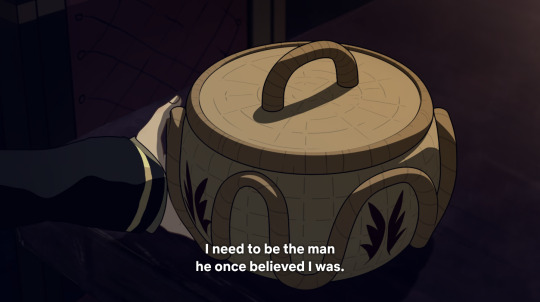
Your sister made him better. Harrow told me he was never as strong or brave
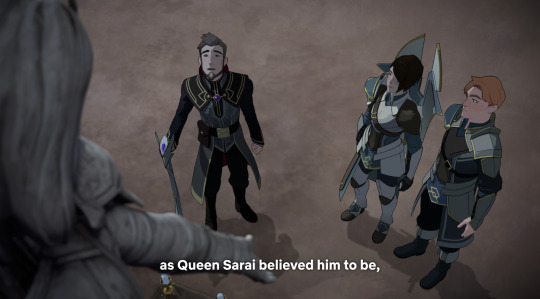
but he tried every day to be stronger and braver so he could live up to what she saw in him. (1x05)
For Viren and for Harrow, this "I want to live up to how you see me" was ultimately a good thing. In Harrow's relationship, he did his best to live up to how Sarai saw him, and that meant being a loving compassionate father, and trying to be a champion of "strength and justice". She reminded him of his best principles and understood them, and it's clear that her words got through to him in his final days with his rejection of dark magic and urging their sons to break the cycle. For Viren, Harrow's words likewise got through to him, with Viren becoming a better father for the first time since Soren and Claudia's early childhood and in what he sacrificed to save Katolis: his own refusal of dark magic, and acknowledging that like Harrow, he should've been a not just a king, but "a servant".
But in classic TDP fashion, someone believing that you can be better, or believing that someone makes you better, is not always a good thing:
Aaravos believed in humans when all the other elves and dragons thought we were worthless, stupid, dirty animals.
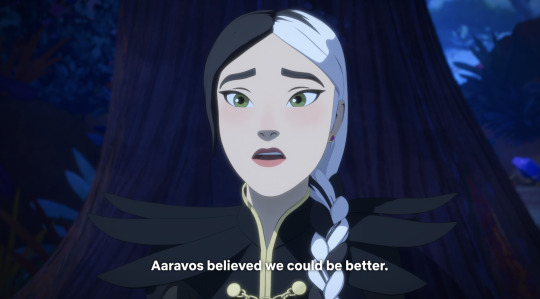
So he gave us magic.
Aaravos' 'belief' in humanity, and in Claudia by extension ("But no matter: your daughter is far more powerful"), is the foundation of her loyalty to him. Claudia is extremely receptive to how other people view her, which is why she's coarse about judgement and tries to maintain a positive internalized viewpoint ("But I'm not evil. It's me. You know me") of her own self and actions, even while routinely acknowledging that she's doing increasingly "vile, dangerous" things. Likewise, her belief in Aaravos begins with faith that he can save her father, evolves into gratitude for what he's given humanity (because until S6, dark magic is always routinely a positive net force to her), and is bolstered by her own feedback loop with a Viren who's trying his best. His assertion that "you do anything for your child never the other way around" while trying to spare her helps her justify Aaravos' actions, since he's acting on behalf of Leola, and therefore whatever he does is "necessary. Like my dad."
Conversely for elf-human relations, we have Callum and Rayla. Callum is also a burgeoning mage, and Rayla is also important to his magical journey, providing a listening ear and occasionally some sound advice. The S2 novelization goes so far as to say that Rayla is the first person to tell Callum
“I believe in you.” Callum blushed. No one had ever said those words to him before, or at least not that he remembered.
And we see her routinely express faith in her friends, particularly Callum and Ezran, even when the odds are stacked against them, other people disagree (Runaan, Lujanne, Sol Regem), or they don't have faith in themselves:
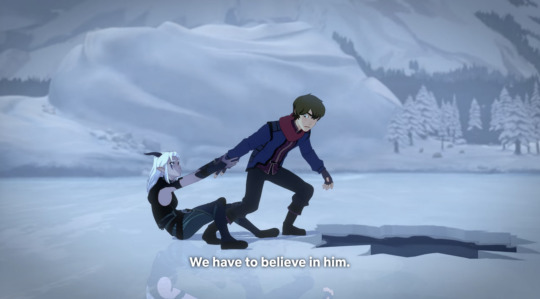
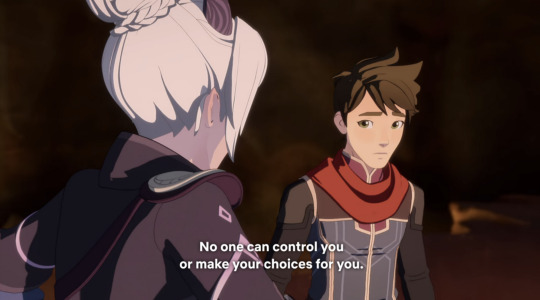
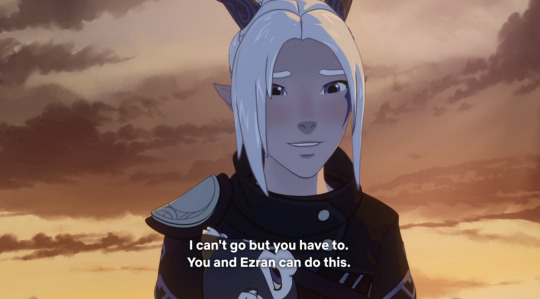
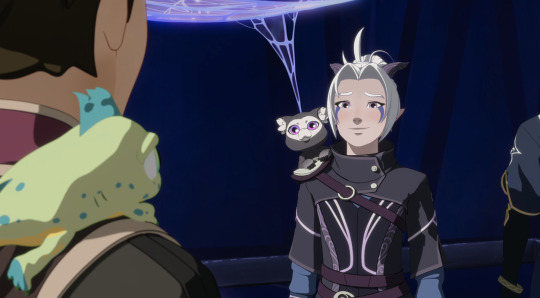
She has faith that Katolis and her boys won't be like the Silvergrove when she returns (and they aren't). She does her best to believe in Ezran in 1x09, or at least not be a jerk even if she can't totally take him at his word due to her own skepticism. She's another elf who also believes that humans are capable and strong, and sometimes even more so than elves:
The human kicked dirt at her, and Rayla scraped at her eyes, angry—infuriated, even. Humans were frustrating. Humans were clever. Humans could do anything, they could be anything, they could take their own fates and change them—
Which is, of course, the opposite thread of belief that Aaravos actually holds, which is that his pawns will always make his parts and that Callum playing into his hands and being nothing more than a pawn is inevitable. Callum also returns this in 5x01, citing "If she didn't tell me, she had a good reason," and that knowledge/belief is all that needs to not only set Rayla free, but reassert that she doesn't owe him an explanation until she wants to give one free of obligation and guilt — as she eventually does, changing her fate bit by bit at a time.
So does being believed in make you better? Overall TDP says that it can if you let it and work consistently towards it, but it does depend on what the belief is. We'll also loop back around this idea when we talk more about TDP's thread of having faith another section from now, but moving forwards to:
Belief as a Continuing Thread
The distinction between "this person believing in me" as an act of betterment versus "belief as a continuing thread," is, in my head, a difference of actively working towards living up to person's belief in you versus that belief forming a continual relationship foundation of stability and stagnation rather than change. In other words, belief as a continuing thread probably bleeds in the most into worldviews—I am a good person because I do Y, I stand by your side because of X, and as long as those beliefs built on actions aren't disrupted, they are maintained.
We see this perhaps encapsulated most in Terry and Claudia's relationship. Terry's belief in Claudia isn't about any sense of making her better ("Look at her sleeping, she's just perfect"—4x04) or guiding her down a specific path ("I can't [tell you what to do]"—6x04). He's not trying to change her, but instead, it's the foundation of his support for her. His belief in Claudia is built into their dynamic and why he is so loyal to her, as he explains in 4x09:
I've seen you do a lot of awful things, dark magic things. But I always believed in you because you had a reason.
As touched on here in a meta more about Terry overall, this is also why he doesn't like Aaravos in S6, because Aaravos' reasoning isn't love but revenge, and that's Terry's internal tipping point, even if Claudia can't recognize the distinction yet.
Of course, we can also see these continuing bonds of belief be severed. Unlike how Viren was trying to live up to what Harrow thought of him, or Harrow with Sarai, Viren and Kpp'Ar's relationship was a much more outright, direct mentor-mentee dynamic, Viren even following in Kpp'Ar's footsteps to become high mage:
I turned on him. My mentor, my... my teacher. A man who believed in me when... when I was nothing, and spent years of his life invested years of his life helping me become... what I became.
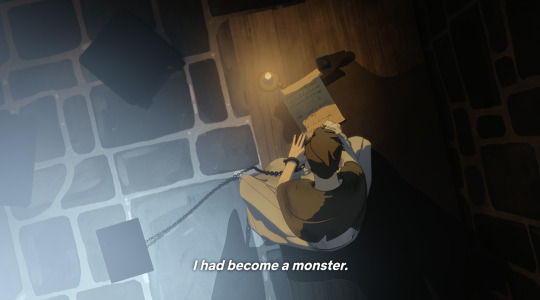
It's worth noting, I think, therefore, that while Viren does have clear regret over coining Kpp'Ar, he does still describe the act as necessary to Lissa in the past and in recounting the event in the letter. It is only after he takes Lissa's tears by force that we see him directly agree with her assessment of him being a monster. We also see Viren's continuing search for importance ("When I was nothing" / "I thought you were going to be something special, something important!" / "You're a nobody" to Kpp'Ar) parallel Claudia's views on dark magic as well ("We weren't born with magic, we were born with nothing" / "Humans had nothing").
This continuing thread of belief is also what allows Rayla to bring people back from being 'monsters' in a way with Esmeray and Runaan later on in the season through her faith that she can get through to them and help them, and that they're capable of receiving help.
In a similar vein of disillusionment of Viren and Kpp'Ar, though, we also see Soren come to this realization (and then back again, in some ways, in S6) with Viren:
I've known Viren longer than anyone here. I mean, because he's my dad, but it took me a long time to understand who my dad really is. And it was hard to see, because I really... I really looked up to him. He's smart, and the way he talks, you really believe that he's a good person, that everything he does is to protect his family, his home, or all of humanity. He makes you think that as long as you do what he says, you must be doing the right thing. Even when he asks you to do something bad. Something evil. So the truth is, someone who wants you to do horrible things and convinces you that they're good, that's a villain. My dad is a villain. And he's only gonna get more powerful, and the more powerful he gets, the more people will listen to him, and believe him, and follow him.
We see the continuing thread of Soren not trying to change Viren or Viren trying to change for him (in arc 1), but of Soren understandably believing in his father and Viren's judgement precisely because of things Soren perceives as lacking in himself ("I know I'm not the smartest / Dad is so smart, so I figured there must be a good reason") and because as a child / young adult, you're inclined to believe whatever your parent tells you at more or less face value. That said, Soren does talk specifically about how belief in others can intersect with belief in leadership, which is interesting in its own way. So let's move onto:
Belief as Faith / Having Faith In Our Leaders
Having faith in our leaders is something we've touched on already, albeit indirectly. Sarai believed in Harrow to be "a champion of love and justice"; Soren and Claudia believed at different intervals that their father would be a good leader. We see this reflected in Janai and Amaya's relationship predominantly in season 6:
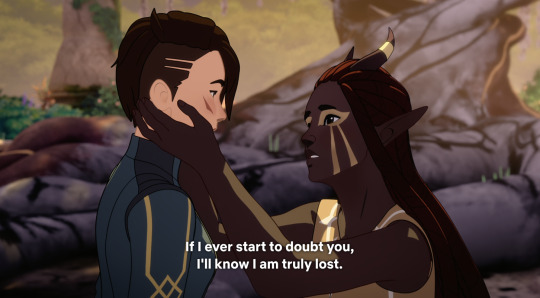
Do you think I can lead my people after everything that's happened, all the mistakes I've made?
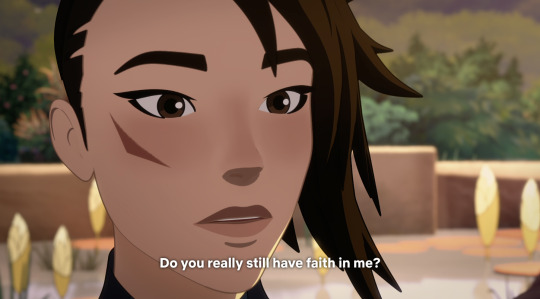
We see this similar theme in how Opeli and Corvus interact with Ezran in S3, where they support him as a monarch, specifically, as well as a person:
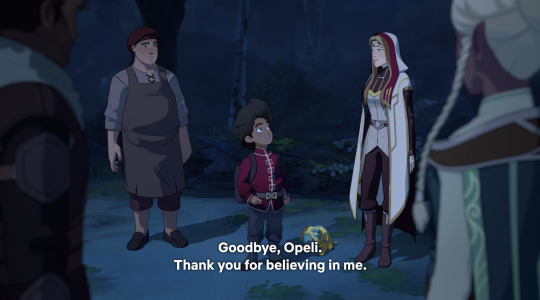
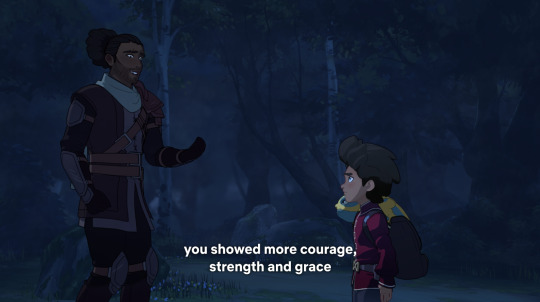
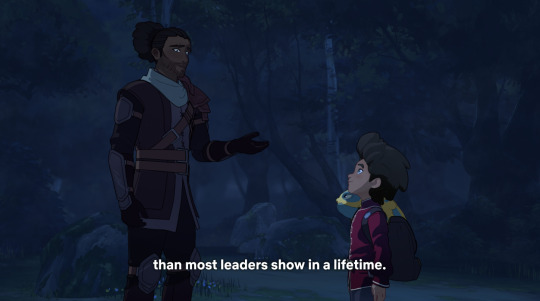
Ezran and Janai are also characters who tend to have a lot of faith in others, as well, which is part of their leadership. Janai has "patience and faith" that they can rebuild, that the architect can make her amends, etc. Ezran routinely has steadfast faith in his loved ones and their ability likewise to be better (not executing Viren, setting Soren and Claudia free, "She'll know what to do" / "she's alive, and wherever she is, she loves you too" about Rayla, "I think he would want you to, if you wanted to" about Callum and Harrow, etc). Even with Zym in season two:
But we'll get it, no matter how impossible it seems. We believe in ourselves, and we're not giving up, are we?
which is also a sentiment Janai extends to her people:
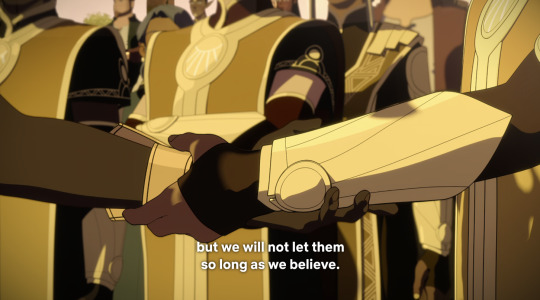
So we can have faith in others, in ourselves ("I will learn magic. It's who I am"), in our leaders, some prejudiced worldviews ("No, humans are liars" / "Are they really your friends, or are they just taking advantage of you?") and have all those things intermingle. We've talked briefly about disillusionment in threads of continued belief, and failing to live up to the beliefs / views of how others see us, or when belief breaks. I want to close this out by talking about Runaan and Rayla, briefly, namely:
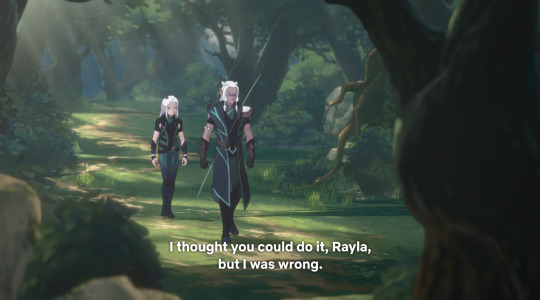
This fits in this section (in my head) precisely because Runaan is Rayla's leader as well as her father, which is a unique dynamic that only Viren-Soren&Claudia get close to replicating, of being believed in by someone who also very explicitly tells you what to do (hi Claudia with Aaravos). Runaan lived in one reality (Rayla can be an assassin) and then immediately went to the other (she never will be) with no in between.
Meanwhile, we have characters like Ellis and Callum, who are able to acknowledge other people's realities even if they can't (for a variety of reasons) fully commit to them and sit somewhere more in the middle, which I think is interesting, particularly when it likewise comes to changing plans or acknowledging other realms/perspectives of reality.
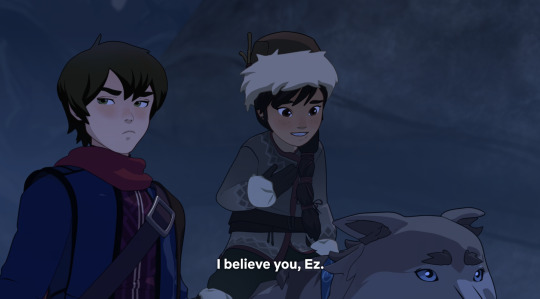
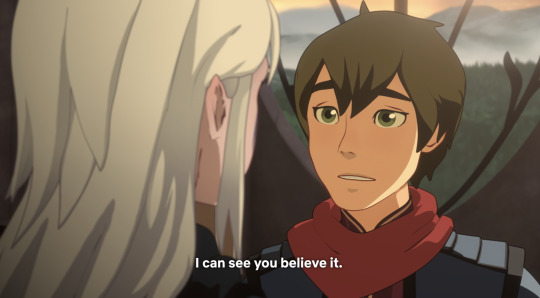
And if I go any further into those weeds I'll start talking about TDP's whole emphasis on trust that is twice as long as this meta already is, I'm sure, so with that I'll wrap things up (sort of).
Conclusion, Kind Of
This doesn't have a real conclusion because this is so sprawling with like, a hopefully but not necessarily coherent common thread, but basically:
When you act in alignment with how others see you, this can help you live up to your 'full potential' — good or bad. And if it's bad, that might be a time to break their continued thread of faith in you, or you towards them, in order to be something truly better and new. All relationships, positive or negative, depend on faith/belief because they depend on reliability and expectation, and when those things are broken, this can either transform a relationship for the better or demolish it completely.
Are you having fun? Was this fun?
Anyway can't wait for S7 to ruin my life with Terry-Claudia, Callum-Ezran, and Callum-Rayla's threads of belief in particular.
—Dragons out
46 notes
·
View notes
Text
Went outside to pull velcro plant out of the yard, which let me tell you does not take brain cells, so also spent the time thinking about the "WTF, Bill Heterodyne, why trust Lucrezia and not the Jägermonsters" dilemma.
And what I settled on was the concept of - indeed, the allure of - redemption.
Long post under the cut...
Bill Heterodyne, after all, could have inherently been a Thing of Evil (as he saw it; I'll put the more pulp black-and-white concepts in capitals), but instead was Redeemed by the Love of his mother Theodora, who stood between her children and their objectively monstrous father. Bill's entire life story, which he would have profoundly internalized, is that he would have been something else, something dangerous, if he and the people around him hadn't worked - constantly! - to make him a Force for Good instead.
And indeed, he and Barry went out and performed this redemption narrative in their role as the Heterodyne Boys. They were famously active, visible, persistent Heroes, trying to rewrite the story the rest of the world (after a thousand years of "Heterodyne" meaning something quite different) wanted to put them into. And it worked!
In that light, we have two separate case studies:
Lucrezia's story, at this point, parallels Bill's in ways that he would have been drawn to. (We are, of course, not looking at everything that's happened to Lucrezia since then. We're in pre-canon Lucrezia territory.) Young Lucrezia Mongfish comes from a similar background - a powerful Spark from a family of Deep Evil. But in flashback, we see her choosing - performatively or not, however sincerely or not - a different path by choosing to become one of the Good Guys and marry Bill. (These things seem to have gone together, which is a whole different story.) This is an active choice. This, I argue, is what Bill was attracted to: the idea that you, no matter who you are, can choose your nature and your fate. You can become Good - but it is a choice.
That was, after all, the story Bill was telling himself. Lucrezia's choice validated his - and his mother's choices too. The choices Theodora had died for. The Path of Righteousness could be chosen - indeed, had to be. And it's that element of choice that makes the difference here.
It's a very tempting narrative, for someone raised to despise and fear the more infamous side of his family - and indeed himself.
The Jägermonsters, on the other hand, take orders from the Heterodynes, and always have. Are famous for it, actually. Bill could have told them to be Good Guys now, and they would have listened! Dimo tells Agatha that it sounded like fun, and they wanted to try! If Bill had only enlisted them in this fine new game. But it would have had to come as an order from the Heterodyne. It wasn't their idea, and they wouldn't have done it on their own. Do you see the Horde sitting down and considering their ways and having a mass - or even individual - change of heart? No, me neither, and neither did Bill. Receiving and obeying an order to "be good guys now", to Bill, wouldn't count. Not with centuries of destruction apiece behind them. That wouldn't be a true change of heart, it would just be another order.
If just one or two Jägers had gone to Bill, individually, and said, (in the appropriate accent) "Master, we understand, we want to Be Good and do better, can you show us how?", would Bill have believed them? Welcomed them as converts? Could things have been different? I don't know, but I think yes.
Redemption is active. Redemption is a thing you do. It's a thing you work at. That's what Bill was drawn to. Not Evil itself, but the refutation of it.
Forgiveness, by comparison, is passive. Forgiveness is a thing you receive, sometimes whether you work for it or not.
(We're also into pretty solid Catholic guilt territory here, by the way, rarely to be overlooked with creators with Italian surnames. I could cite Bible verses if I really wanted to take the time, but I DO NOT.)
...I don't know if this is coherent, or new, or relevant, but those weeds were really boring, so this is what you get when I have to do yardwork.
#girl genius#the heterodyne boys#bill heterodyne#headcanons and speculation#attraction of redemption
98 notes
·
View notes
Text
Arcane season 2 arc 2 thoughts
First of all. LOVED it.
Second of all: I'm DISTRAUGHT
Third of all: Where. The fuck. Is Ekko.
Okay but in all seriousness.
I did quite enjoy these episodes. And the emotional impact, as always, was phenomenal.
They did a fantastic job attaching us to Isha. Like we all saw her death coming, right? And it was still a devastating blow.
I am curious if this is going to cause Jinx to regress? I mean Isha was a big part of her newfound stability and... well, we all saw how she reacted when Isha was just captured. Now she's gone, gone because of Vander, no less.
It was absolutely heartbreaking seeing her attempt to still get through to Vander. Also. Vander's tears. I am going to break something.
The parallels of Sevika pulling Isha away as Jinx attempted to sacrifice herself and Vi pulling Jinx away as Isha sacrificed herself. AUGH.
Also. Potential Vi, Caitlyn, Jinx teamup? Let's fucking go?
Does this mean that the conflict in arc 3 is going to be noxus versus everyone else? Because HELL YEAR.
I will be completely honest, almost all of this arc blindsided me. It didn't go anywhere near where I thought it would.
I thought the whole conflict here would be focused on topside vs bottom. I thought the war between the two would be in the spotlight a lot more than it actually was. I thought we'd spend a bit more time on Vi's spiral and a lot more time with Commander Caitlyn.
In fact, I feel like that whole part of the Arc was... just a little rushed? Vi and Caitlyn's reunion honestly felt... too easy. Like no acknowledgment of the last time they saw one another? No apologies? No hostility? Just like that?
I mean it reflects how neither of them could ever really let go of the other, and how they both carry regrets, which I get. But I'm hoping they'll take time to actually address that in the next arc, even in a small way, as well as the lingering hostility between Jinx and Cait.
Honestly I think the immediate switchup as soon as Caitlyn saw Vi again was a little funny. Insert joke about average lesbian situationship.
and of course. JAYCE. BITCH. WHAT THE FUCK.
Admittedly, Viktor's commune was definitely a cult. But still. My guy.
Also how are all the Skye fans doing? Y'all feeling alright?
I personally find all the stuff with the arcane super fascinating. And it's crazy that all of that shit takes a backseat to the lesbians and the dysfunctional family. The unnatural amalgamation of magic caused by Jayce and Viktor messing with forces they don't fully understand, with the potential to destroy or permanently alter reality is the b plot. Tell me that's not hilarious.
Also if Mel dies I will be suing for emotional damages :)
I saw some people theorizing that Mel's armor/gold plating had some sort of magical properties. So uhh... how are you guys feeling about being half-right?
Uhh... anything else?
Oh yeah. WHERE THE FUCK IS EKKO.
Alright. I'm done.
#arcane#arcane league of legends#arcane spoilers#arcane season 2#arcane s2#vi arcane#caitlyn kiramman#caitvi#jinx arcane#isha arcane#viktor arcane#jayce arcane#mel medarda#mel merdada#mel arcane#ekko#ekko arcane
32 notes
·
View notes
Text
615 & 805 Cemetery Scenes
Fandom has already pointed out the fact that the scenes are parallel but I wanted to share my thoughts on exactly what that looked like and what it could mean moving forward.
In 615 Eddie mentioned Marie's line "We're all gonna die alone" from earlier in the ep. Buck then offered Eddie a little perspective and comfort saying that Marie was surrounded by friends and family. They got really real after Buck confessed that he feels different after the lightning strike. Eddie empathized and acknowledged that it made total sense that Buck felt different. He told Buck that he doesn't have to be any particular thing for anyone else and that "we're all different from one minute to the next". At the end of their talk, Buck pointedly noted that everyday since the lightning strike is "a gift".
The core themes were alienation and loneliness, and the healing power of connection and being seen by loved ones.
In 805, at the same cemetery but with Tommy this time, Buck talked to Billy Boils about the curse he put on him. He mentioned his arm injury and of course the boils. Buck made special mention of Tommy not wanting to kiss him. Tommy denied this but it seems safe to assume that Buck wouldn't have said it if Tommy had touched him at all up to that point. Anyway, the meat of Buck's eulogy for Billy was recognizing the "curse" as actually being "a cry for help". He realized that Billy was lonely because he was abandoned by his posse. Buck waxed on about how "our people" make for a life worth living - full of memories, help when we fall down, keeping us on the right path, and generally just being there. This scene's crescendo was when Buck said plainly "I can't imagine anything more painful than going through life alone". He then told Billy "I'm your posse now". Buck felt that by joining him, Billy could rest and that he'd lift the curse. On their way out of the cemetery, Tommy quietly echoed Buck's request that Billy lift the curse.
As convoluted as the Billy Boils metaphor was, the 805 cemetery scene with Buck and Tommy still had similar core themes to the 615 cemetery scene with Buck and Eddie. Loneliness, and the healing that comes with connection and being seen by others. Buck saw Billy in the end and that was what he felt could and would lift the curse.
Between the two scenes I'm especially fixated on a few key details:
Buck (805) and Eddie (615) were and still are wrestling with loneliness.
Buck was in a questionable relationship in 615 with Natalia and he's in one in 805 with Tommy.
Buck being distant from who he used to be in 615, distant from Tommy in 805, and Eddie looking isolated in the 805 montage
The loneliness common denominator in both scenes is actually Eddie. In 615 he's actually the one who brings up loneliness and in 805 his absence is actually louder than Tommy's mere distance.
The twist in the 805 Billy Boils subplot was the fact that Billy was actively **betrayed** by his posse. That element wasn't technically present in the 615 scene but I would argue that **betrayal** was implied because if Eddie's facial expressions were meant to be any indication in that episode, he felt some type of way about Buck feeling seen by Natalia when Eddie himself had been by Buck's side the whole time.
We saw Eddie taking the same trusted bestie role in 805 by going to the hospital with Buck and actively translating for him with Tommy when he came to visit. I think Eddie feels some type of way about Tommy too but he's Buck's bestie first and foremost so he just watches them when they aren't looking and interjects when necessary because he knows that Buck wants his relationship with Tommy to work. Yet, Eddie is mourning the fact that Chris is still gone and very upset with him pretty much all by himself since the start of season 8. Buck is with Eddie in spirit because how could he not be, still they haven't actually had any screen time where they've discussed it.
I'm hoping the anticipated 806 scene between them addresses Eddie's loneliness in the context of that grief and that Buck actively joins him. The other aspect of it that seems relevant is that Buck is actually pretty distant from Tommy. Pretty much all of Buck's bids for connection with Tommy get brushed off. If Buck does have a scene where he connects with Eddie over their shared Chris grief and Tommy knows about it, it could reveal the wedge between Buck and Tommy. They've already laid the groundwork for Tommy as an outsider/visitor looking in on the 118. A deep moment with Eddie and Buck that isn't played for jokes could force a BuckTommy conversation about the divide between them. Bonus points if all the crap from Tommy's past is also in the mix.
I've been having a hard time enjoying this season but this episode actually did deliver at least a few morsels to savor so I'm grateful for that.
26 notes
·
View notes
Text
🪨Venture (OW II) x (gn) reader ⛏️
(Mortician Reader Edition!)

(Picture’s not mine!)
(Request here! Hi :) Just another thing for my favorite history geek 💖)
- You know what they say about morbid curiosity, it cultivates people who think the same way, or, at least makes one willing to see other things with open mind…
- And by all means Venture is a person who has a open mind when it comes to different things, readily able to accept and eager to learn whatever they can about something, even if that something may be considered unorthodox.
- They see it as a way to see how both the past and the present treat the dead, how things like funerals or other death rituals were able to evolve into what it is now.
- Again they love to hear about your job, taking in whatever you tell them and responding with things like “Oh that’s so- So AWESOME!!! That has so many parallels to something I saw in a book recently!! Did you know—“
- They ask everything they possibly can, even more so in comparison to others because of its details, which brings up the topic of morbid curiosity, which they have an abundance of.
- Thrilled in a way that is the rare case of innocence and curiosity, asking so many questions about your job what it entails, knowing that it’s more than just a occupation that demands a person to be respectable to something that used to be human.
- There’s something about bodies, both freshly dead and long gone that can scare most people, but not you two—
- You guys do the jobs that could be considered as not beneficial but that’s not exactly the truth, you guys do what many can’t, see and treat things that were always apart of human history, both ancient and recently gone.
- Again tries to help you in the ways that they can, but of course that help is limited considering you’re the only one registered to work with these bodies.
- Though of course planning funerals and such is something they do have more merit over, helping you order and bring in things, not staying for the funerals of course but being a beneficial help.
- They love just how sympathetic you can be towards the families of these people during such vulnerable times, to give their departed loved one the justice they deserved as they saw them one last time before their body was put to rest.
- Tragedy is a significant part of being a mortician, you might not be the one experiencing it first hand, but you do have to put yourself into the effort of giving the departed a service akin to what their loved ones would deem justly—
- A sense of respect that Venture has found themselves tangled as well as they deal with ancient artifacts and the like.
- It is, much like any other job concerning the aspects of life, death, and everything in between, a demanding job that requires consistent scheduling, planning, financing, etc.
- And it may get in the way of your relationship, but Venture would never take it seriously considering their job does much of the same as they go from place to place for excavations.
- If a specific funeral strikes a cord with you, they’re quick to be a listening ear, providing support in any they can as they convince you to say what you are experiencing, life in general can be taxing, catering to the dead is something not many can say they do.
- You both contribute to society in a less than typical way but you still are doing what is best, and that’s something Venture and you can relate to well.
- They adore you with every occupation you decide on, whether you have it already or studying to get it they’re so happy to know that you are doing something you are genuinely interested in rather than letting yourself have a job that doesn’t feed into your aspirations.
- Whenever the situation allows it, they’re do make skeleton puns, not much of a surprise there considering it’s Venture.
- Just keep in mind that they love you and they are there when you need it.
(Finally, I’ve been working on and off on this for a bit lol)
18 notes
·
View notes
Text
Hopper Threatening Mike
Something that I think about all the time is what the heck Hopper threatened Mike with in the first episode of season 3.
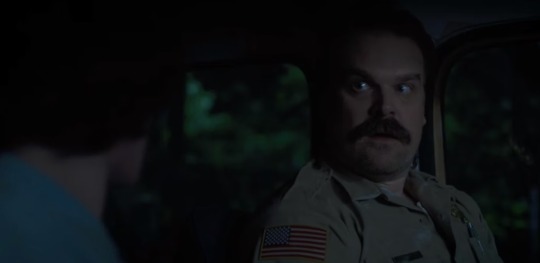
Hopper tells Joyce he had to “improvise a little bit” when he tells her about the heart-to-heart. Well you know where else we see the word improvise pop up? When he mows down 4 Russians in the last episode. He literally kills 4 people, says “I’m improvising”, and then puts on a Russian uniform. Murray tries to handle the situation calmly at first but that lasts like 5 seconds, which is about how long it took Hopper to lose his patience with Mike while attempting the heart-to-heart.
According to Mike, Hopper didn’t threaten him with death so what else could be so bad? I don’t know but I think it has to do with Will. When Mike says the words “he threatened me,” the shot we see is of Will setting up the DnD board. This might not mean much on its own but then we have the Karen/Billy and Mike/El parallel.
The Pool Storage Parallel:
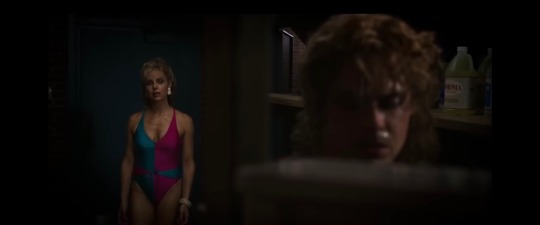
We get two scenes that happen in the pool storage room. The first one is Karen explaining to Billy why she didn’t meet him at the Motel pool. She tells him that she has a family and can’t do anything that would hurt them. What made her change her mind and not cheat? Seeing Ted sleeping on the couch with Holly. And what’s Ted wearing? A shirt that is stupidly similar to the one Will is wearing during his and Mike’s movie date.
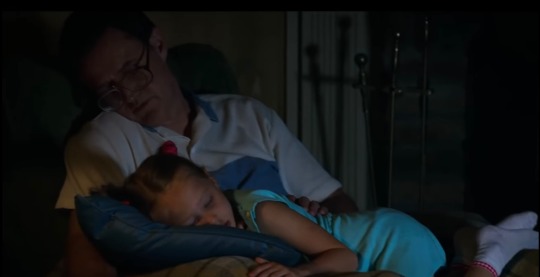

The scene of Karen and Billy also comes directly after the scene in which Max tells El to dump Mike if he doesn’t explain himself. In the immediate next scene, we have Karen saying “I want to explain…” to Billy.

So explanations happen in the pool storage room. Just like his mom, Mike goes into the storage room to explain why he didn’t show up as planned. He tells El that Hopper made him lie, however he doesn’t say much more, just that he said they’re spending too much time together. This is a pretty garbage explanation though and we still don’t know exactly why Mike lied. Even Lucas questions why Mike did it.
If these parallels means what I think they do, Will is the “family” that Mike doesn’t want to hurt, and is the reason he had to lie. So what was the threat? I highly doubt it’s something as simple as Hopper threatening Mike with not letting him see El anymore if he doesn’t back off a bit cause 1. that wouldn’t work considering El has legit superpowers 2. that’s too basic of an explanation to warrant keeping the details of Mike and Hopper’s conversation a secret (they even remind you that we don’t know all the details when Hopper makes plans to tell Joyce about it at Enzo’s, which of course doesn’t end up happening) 3. they put way too much effort into the parallels for there not to be more there.
I don’t know exactly what I’m trying to imply. Maybe Hopper has witnessed the way Mike splits his time between El and Will and sees right through him. I mean he did witness the shed monologue and saw how disinterested Mike was in kissing El in season 2. Does he think Mike is using El?? I don’t know. I know Hop is just like Mike and wants El to himself but there’s just gotta be more here.
Would love to hear your thoughts! 😛
518 notes
·
View notes
Note
I couldn't stop thinking about you pointing out the theme of eugenics in this season finale. Finding out Kendall might be sterile was the icing on the cake. And Tom, who doesn't sleep and can withstand physical pain ends up at the top... he's got a dick like a red sequoia and he fucks like a bullet train.
this is a really interesting line of inquiry imo, because you're right that the rhetorical appeal tom makes to matsson very noticeably uses the language of physical strength and bodily fitness. at the same time, we know this to be kind of a lie: tom's been suffering for lack of sleep, he dipped early from the funeral reception last episode, and he spent most of season 3 terrified of the potential violence he could face in prison. i don't say this to pass some kind of judgment on tom, but to point out what i think is a parallel to logan, who also relied on the language of strength, masculinity, and domination, yet was introduced to us as sick and was in varying conditions of sickness / disability throughout the course of the show. both these characters are living in human bodies that are susceptible to various forms of pain and physical limitation, yet their rhetoric and the fascistic demands of corporate masculinity mean they can only survive and succeed by denying these things about their bodies for as long as possible.
the connection here to fertility, impotence, and sexual performance is fairly clear. fucking and impregnating someone is a way to demonstrate not just your power / ownership of that specific person, but also your general bodily fitness and place at the top of the corporate and gender hierarchy. there's some degree of ambiguity about tom's actual sexual performance, but certainly he uses the claim that he has a big dick and fucks well as a demonstration to greg not just of how he 'got' shiv, but also to justify his general position at the company. also, although shiv's motives for voting against kendall are complicated, it is true that she ultimately had to choose between her brother and her husband, who is also the father of her child—so, in some sense, tom's ability to ejaculate and impregnate someone does eventually win him the company. as for kendall, his literal infertility is really the bodily symbol of his metaphorical impotence in logan's eyes. logan sees him as weak for being emotional, as morally lax for using drugs, as pathetic for stuttering, and so forth. logan doesn't talk about his infertility (in the show), but the way he frequently uses feminising language toward kendall, and accuses him of homosexuality, also shows how kendall's infertility is perceived as a failure of his masculinity.
for logan and thus also the rest of the roys, what this ultimately comes down to is a specifically hereditarian idea of bodily fitness, wherein parentage and bloodlines matter as much as environmental circumstances (all of these factors matter in eugenic discourses). logan has defined himself as worthy and physically fit, so his legacy has to be carried on by offspring who inherit these things from him. in this way logan subconsciously hopes to prove his own strength and ability even beyond his death, as the survival of the empire and the bloodline will continue to signal his personal bodily capacity. of course this also betrays a deep sense of anxiety in logan, who fears that if his children are 'weak' or 'unfit' in some way, it also implies something is wrong with his own body and reflects poorly on him. this is partly what drives his clear embarrassment of his children, like in 'tern haven' when confronted with a rival family dynasty that speaks the language of high culture more successfully than the roys. it's also implied that this is part of what made logan view connor as a failure so early in his life: having his mother institutionalised suggests that logan saw in her a mental weakness or defect that would potentially be inherited by connor. parentage can biologically secure the child's position, but can also threaten it; and the child's fitness or lack thereof also reflects back on the parent. this sort of biological anxiety is both a discourse of fixity and one in which loss of status is always a possibility, eg in the ever-present fear of disability.
also, the causality in the show runs in multiple directions: sometimes a power dynamic shifts and is then inscribed on the body (shiv tripping in 'honeymoon states'), other times the bodily event is itself a cause of a power shift (logan yerfing in 'argestes'). then there are threads like matsson being physically so much larger than roman and kendall, in conjunction with his team being specifically young people who are athletically fit and academically credentialed, and matsson flashing his abs to make a business deal. and of course, matsson telling tom he might fuck his wife, and tom basically just nodding along—which tells us a lot about the power dynamic matsson foresees between himself and tom. bodies on this show are explicitly part of the political and rhetorical field of action, and the characters' ideas about bodily fitness are supposed to cue us to these larger discourses about which bodies are 'correct' and 'deserving' of power.
342 notes
·
View notes
Text
(First of all, English is not my first language so sorry if there are some mistakes long essays are hard to write djhdsfs)
HELLO GOOD MORNING CHERIK FANDOM SO the other day I made this post about a very hurtful and surprisingly overlooked parallel: Cherik not being able to shoot each other. Aaaand that second scene from DOFP where Erik is unable to shoot Charles has been keeping me awake at night for AGES and I really feel like we don't talk enough about it. So, here I am. Still being pissed off because of some fictional characters not kissing in some movies made years ago lol
So, here's an extended extract from that scene:
So. Erik's plan here is to kill Raven, bc you can't use Raven to create evil war machines if there's no Raven am I right lol. Charles, before Erik can shoot his sister, puts himself in between the gun and her (btw shoutout to Charles for being brave enough to put himself in front of a gun again after what happened in Cuba and the ptsd he 100% has bc of it I love you muac).
Let's make things clear here: There was nothing stopping Erik from killing Charles in this scene. He could've done it. Erik's mission at that very moment was to kill Raven, and Charles was getting between his mission and him. And we all know how things end when something gets in Erik's way when he's completing his mission. Erik does not care about collateral damage. For fucks sake, in this very same scene, he was willing to kill Raven off just bc it was easier and faster. He doesn't give a fuck about who has to die in favor of the greater good.
And I mean, technically, Erik should be more willing to kill Charles than Raven. Raven was his right hand for a while before he went to prison and she was his canonical lover. Charles, at this point in time, was his enemy. Both of them are very powerful mutants, with the difference that Raven is usually by Erik's side, and Charles is one of the only people in the world able to stop Erik thanks to his mutation. If Erik was willing to kill Raven, he should be willing to kill Charles too, if not as much, then more.
So... Why not? Why not shoot him, and once Charles was down, kill Raven too? Why is he able to attempt to kill Raven (his former ally and EX LOVER) and not Charles?
🤨 🏳️🌈 ❓
ALSO, now that we're here: Let's talk a bit about Dark Phoenix, too.
So, let's face it, DP is a bad movie. Overall, it's boring and that's pretty sad counting the masterpieces FC and DOFP are. But, hey, I can live with a boring movie. It's fine. What I CANNOT live with are things that are out of character. Especially when my fave characters are out of character. Ok maybe I'm being a bit too over dramatic here but I'M NOT
So: Let's talk about how Erik wants to rip the world apart over Raven's death in Dark Phoenix bc he's just so destroyed bc the love of his life died or whatever. Dude. I'm sorry but I don't buy it.
Correct me if I'm wrong here bc there's been a while since I don't rewatch Apocalypse or Dark Phoenix (again, meh movies), but from what I understand Erik didn't spend more time with Raven, apart from that bit in Apocalypse? Because after DOFP, Erik distanced himself from anything related to mutant wars to create a family, and then after Apocalypse Erik created Genosha and Raven stayed at the mansion, isn't it?
Assuming that this is correct, they're trying to tell me that between the scene where Erik was willing to kill Raven over the greater good in DOFP and the scene where he was willing to rip the world apart bc of her dying in DP, Raven and Erik only saw each other once. Riiiiight.
And, look. I'm not saying that Erik wouldn't feel sad about Raven dying. Of course he would. He's not made of steel (bc most steel is not magnetic. Get it? Magnetism, Erik... Imma shut up lol). Obviously he would feel bad. And I'm not saying that love can't last that long if they haven't seen each other in a long time, bc c'mon. I'm a cherik shipper. Of course I believe it can.
What I'm saying is that I can't believe that Erik is so devastated that gets blinded enough by his broken heart to hunt down a teenager that's being haunted by something she can't control. I can't believe it bc 20 years ago, it was him who was trying to kill Raven (and almost succeeding), a time that was way closer to their partnership and relationship than when DP takes place. If anything, he should be more affected in DOFP. Instead, he goes from almost killing her himself to wanting to rip everything apart bc of her death.
It. Doesn't. Make. Sense. So, Dark Phoenix's Raven x Erik plotline can suck my dick lol. If it doesn't make sense with the character's previous actions, it's not canon. That's how this works lol I don't make the rules
Summing up: Erik willing to kill Raven but not being able to shoot Charles in DOFP is EXTREMELY fruity and romantic, and Dark Phoenix's romantic plot between Raven and Erik makes 0 sense and is forced as shit
End of rant, thanks for hearing my ramblings on these gay old men and I hope y'all enjoyed it!!
(Also, of course, happy new year!!!)
#i love making theories about 10 y/o movies sm sdjkfsfjdsksd#cherik#charles xavier#erik lehnsherr#erik lensherr x charles xavier#mutant husbands#x men#xmen#xmen days of future past#xmen dofp#xmen dark phoenix#professor x#magneto#cherik gif#cherik canon#x men movies#xmcu#james mcavoy#michael fassbender#raven darkholme
383 notes
·
View notes
Note
Y'know, somehow I never put together before now that all three of the Frosen Steel girls have an arc about struggling with a role/responsibility given to them by their family, and then realizing that it's holding them back from being themselves, and rising above it.
Your Frostbyte post made me think about that parallels between Weiss and Penny, with the obligations of the Schnee family name/legacy and being created combat-ready and assigned to be the Protector of Mantle, respectively.
But then I realized that Ruby faced something very similar with the expectation that she'd live up to Summer's legacy.
Oh my god anon you're so right. A few years I did made a post about the parallels between Penny and Weiss (and I have been meaning to add more to it...), but I also never thought about Ruby also has parallels with them!
All three of them had roles and mantles thrust upon them (albeit in Ruby case she wasn't aware at the start) and it all comes back to their families. Weiss was always defined by her family's name and legacy, Penny was created to save the word by her family* and Ruby is a silver-eyed warrior because of her mother...
*I can't remember how much the show touches on this, but I believe that Pietro genuinely wanted to give Penny a chance to live, but since he was being funded by Ironwood, he had no choice but to let his daughter also be a weapon. Meanwhile, Summer sacrificed herself so Ruby didn't have to become another silver-eyed like her - and in the end failed ("I forced a bigger sacrifice on you") - and Jacques only saw Weiss as a tool. Of course, these situations aren't all that comparable, but just like you said, it is still very interesting to see how all three of them had to learn how be themselves in a way, with Ruby being the most recent when she chose herself.
#penny polendina#weiss schnee#ruby rose#frosen steel#category: text post#category: ask#anon thanks a lot for the ask!! this is just making me go 🤯🤯
37 notes
·
View notes
Note
If you're still doing the character ask game - Ray Vecchio, 1, 8, 12, and 22 <3
Yessss I am always here to talk about Ray, thank you!
1. Why do you like or dislike this character?
Idek man, I imprinted like a duckling or something. I love everything about him. Love his loud mouth, his loud clothes, the armani, the shift between the two fashions, the big nose and green eyes, love his dickishness and complaining, love his selflessness and steadfastness and how they go hand in hand with the complaining, love his family and his shitty dad backstory and his zuko backstory and his childishness with Frannie and his catholicism, love that he will always put his loved ones before anything else he cares about and Fraser gets the highest priority position, love how the show constantly seamlessly shifts from two dimensional cartoon to deep and thoughtful characterization with him as well as Fraser.
I love how he's skeptical but intrigued by Fraser anyway and always ends up convinced by him, love how he was burnt out at first but gets promoted in season 2, love how he vanishes from Fraser's life for the sake of duty, essentially, in what could be read as an ironic consequence for Fraser, love that he'll do absolutely anything for Fraser and feels unappreciated for it because Fraser doesn't prioritize him, love that they get closer and closer to resolving this issue but Ray leaves before it can fully happen.
Character of all time for me.
8. What’s something the fandom does when it comes to this character that you despise?
Ohhhhh boy. I mean I can't stand people characterizing him as Fraser's mean ex of course, but it's pretty rare that I ever saw that because I couldn't get into the season 3/4 side of fandom. Anything that characterizes him as physically abusive in general, which ime pretty squarely rests on italian stereotypes (not cop statistics when every character is a cop) since iirc he never uses violence impulsively in the show - it's always a deliberate choice he makes in the line of duty as part of the cop show format - and the show specifically contrasts him with his abusive father that way. (Though I may make an exception for very thoughtful post Vegas characterization that takes his actual depiction on the show into account.)
Even just like, eg this one Ray/Ray fic I once read where they got into a mutual physical fight kind of bugged me lol because I legit don't think Ray V would.
Among F/V shippers, I really loathe the headcanon that Ray shot Fraser on purpose either consciously or subconsciously. I can respect the attempt for more conflict and angst in theory, but I will die on the Ray V defense hill lol, and he would never. He was clearly aiming for Victoria, we saw that from his point of view in the scene itself, and Fraser deliberately took the bullet to shield Victoria. He sees where Ray's aiming, he runs faster to reach her in time, and Letting Go parallels it with Ray V taking a bullet for Fraser. He also casually protests that it was an accident when they're both over the drama in the tag, which would never happen if that wasn't the case.
12. What’s a headcanon you have for this character?
He wouldn't exactly describe himself as bisexual, but Fraser isn't the first guy he's been with. He had a thing with a bff in high school or college, and because his priority system goes: loved ones > abstract ideals, he doesn't feel guilty about it. Bff is gay, bff isn't bad or disgusting or whatever else, therefore gay sex is fine, at least with him. If asked he might still say it's a sin in general, but Ray absolutely has loopholes for people he cares about.
And if Fraser is his first then again, Fraser takes priority and Ray doesn't even have a sexuality crisis. Oh, Fraser is into men? Totally fine, it's Fraser, and he's never refused Fraser anything before so why should he start now? Especially when he looks so good in the brown uniform.
Relatedly I also envision a backstory scene where he once drove Frannie to an abortion clinic, casually bitched about it on the way accidentally triggering Frannie's guilt and making her cry, then instantly switched to pro-choice talking points that he'd always dismissed before to reassure her.
22. If you’re a fic reader, what’s something you like in fics when it comes to ths character? Something you don’t like?
I love that it's not an uncommon characterization choice to have Ray just bypass internalized homophobia because Fraser takes precedence over all that. Love fic where Ray is attracted to Fraser and knows it, however he deals with it. I love post-canon F/V fic a LOT. Give them their happy reunion and happily ever after!!!
Honestly I'm surprisingly easy for Ray V fic in general, it's pretty rare to find characterization that annoys me. Even if I disagree, I'll usually still buy in for the duration. I love fic where Ray V is there <3 Like, I'll read het fic for him. I read basically every Ray V/Stella fic out there ffs, just for Ray. That should tell you something lmao.
Something I don't like - well there's everything I complained about for question 8 lol. I don't like when fic writers buy into the bitching and moaning and miss the selfless devotion, but that's pretty rare in Ray-centric fic, it's more when he's a side character or just part of Fraser's backstory.
More commonly, I don't like when Fraser wants to get together and Ray pushes him away at first because of internalized homophobia. I'll still read it, but like, I'll be shaking my head the whole time lol.
And lastly, I don't have impassible top/bottom preferences for F/V, but I can't read anything kinky where Ray doms lol, pure personal bias there.
ask meme
12 notes
·
View notes